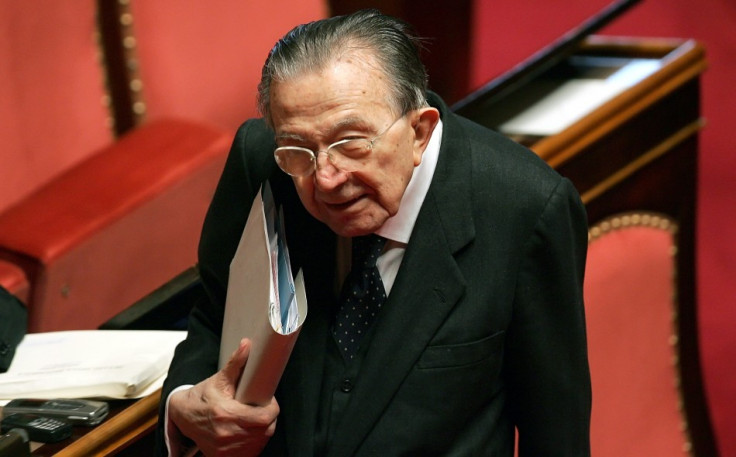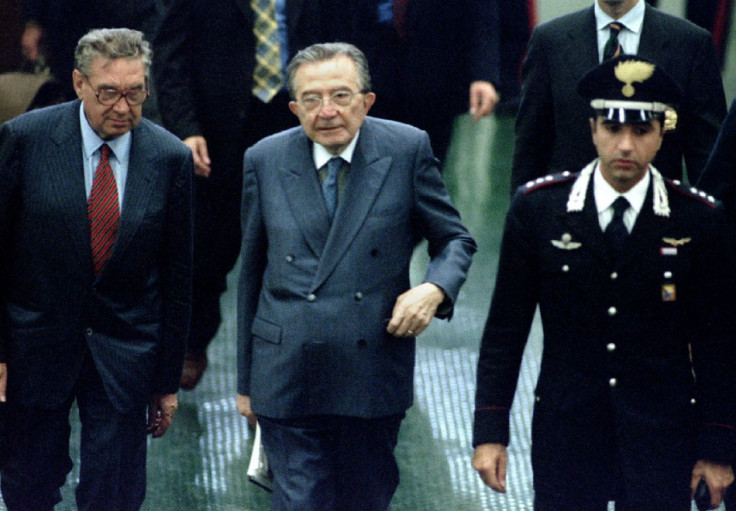Italy: ‘Beelzebub’ PM Giulio Andreotti’s Legacy Sparks Controversy [OBITUARY]
Controversial Christian Democrat leader and seven times PM Giulio Andreotti dies in Rome aged 94

A day after his death, Italy is divided in remembering Giulio Andreotti, one of the most controversial and influential political figures in the country's postwar history.
The Christian Democrat leader and seven times prime minster died aged 94 in Rome, leaving a trail of mysteries behind him.
"The biggest mystery in Italy's first republic is named Giulio Andreotti," said journalist and founder of La Repubblica newspaper Eugenio Scalfari. "He was an extremely intelligent politician as well as a disturbing figure."
Italian president Giorgio Napolitano, current prime minister, Enrico Letta, and other leading political figures paid their last respectsd in Rome before a private funeral for Andreotti.
Once described by former British PM Margaret Thatcher as a man with "a positive aversion to principle", Andreotti entered the Italian cabinet for the first time in 1947, as undersecretary to PM Alcide de Gasperi.
He went on to shape Italy's political world until 1992 when his candidacy for president fell amid the Tangentopoli corruption scandal and the killing of mafia prosecutor Giovanni Falcone.
"To suspect the worst is a sin, but one is usually right," was one of Andreotti's most famous aphorisms. Many Italians applied his golden rule to his own actions.
Eight times defence minister, five times minister of foreign affairs and twice finance minister, Andreotti witnessed from a privileged and influential perspective some of the most tragic events in Italy's post-fascist history and was accused of being the string-puller behind many of them.
"I've been imputed of everything apart from the Punic Wars," Andreotti once famously said.
Relatives of so-called God's banker Roberto Calvi, who was founded hanged from London's Blackfriars Bridge in 1982, claimed Andreotti had an interest in the death of the chairman of the bankrupt Banco Ambrosiano.
And as PM when fellow Democratic Christian leader Aldo Moro was kidnapped by the Red Brigades terrorists in 1978, Andreotti refused to negotiate. In his memoires written during his time in captivity, Moro described Andreotti as "a cold inscrutable manipulator, without doubts, without hesitations, without ever a moment of human pity".
"I don't want to recall your grey career. That's not one's fault as you can be grey but honest, grey but good, grey but zealous. Well no, this is exactly what you aren't, Andreotti. You lack human fervour," Moro wrote before he was killed after 55 days in captivity.
Il Divo Giulio (Giulio the Divine) or Beelzebub, as Andreotti was often dubbed, was accused of exchanging a "kiss of honour" with the mafia's capo dei capi (boss of bosses) Totò Riina and was indicted for alleged links with the mob.
Centrist icon
He was acquitted in 1999. An appeal in which judges wrote that Andreotti had maintained an "authentic, stable and friendly relationship with the mafia until spring 1980" failed under the statute of limitations.
Former PM Silvio Berlusconi, called Andreotti an "icon" against whom Italy's leftists fought battles "based on demonising their adversary and judicial persecution, a trial Andreotti overcame with dignity and composure - and won".
"He was a man with many shadows and a few lights who struck deals with the mafia for political and state reasons," said former prosecutor and left-wing politician Antonio Ingroia.
Licio Gelli, the convicted leader of Italian masonic lodge P2 of which Berlusconi was a member, said the late PM was the only person in the world "who could call himself a statesman".
"He did what he had to: he used secrets to boost Italy's wealth. He had secrets and he brought them with him," Gelli said.
Andreotti was the patron of another P2 member, mafia-linked financier Michele Sindona, who died after drinking a poisoned coffee in an Italian prison two days after being convicted for the murder of lawyer Giorgio Ambrosoli.
Ambrosoli had been investigating the bankruptcy of Sindona's Banca Privata Italiana.
"He was looking for it," Andreotti said of Ambrosoli's death in 2010.
Ambrosoli's son Umberto, a councillor for Milan's Lombardy region, refused to join other councillors in observing a minute's silence to honour Andreotti.
Only history would be able to judge Andreotti's life and political career said Italian President Napolitano.

© Copyright IBTimes 2025. All rights reserved.






















